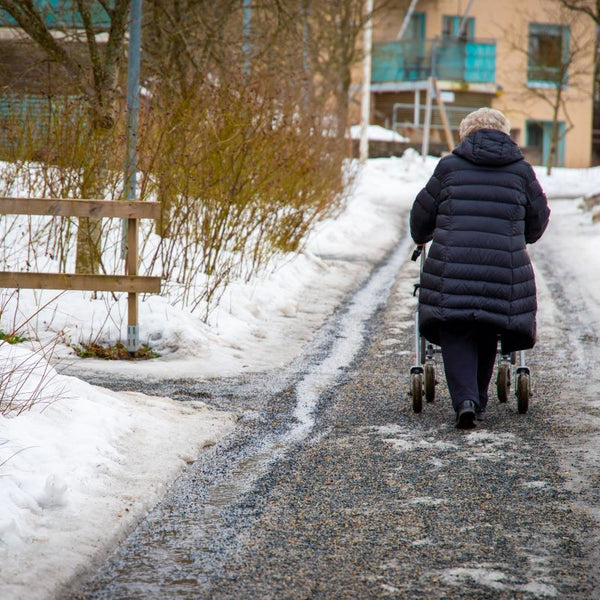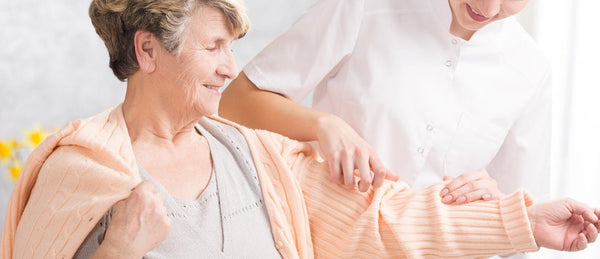If you have older loved ones nearing the point where they may need care or support to live well, distance can be a big problem.
Not only is it harder to spot the signs that Mum or Dad’s needs are changing, but finding and coordinating care from afar can prove stressful and difficult.
Then there’s the possibility that you may have siblings or other family members who also need to be involved in decision-making, but they don’t live near you or your loved one.
Suddenly, finding, sourcing and managing elderly care becomes a logistical nightmare, so how do you solve it?
Take a preventative care approach
Unfortunately, many older people don’t tell their families they are struggling; instead, they are stoically soldiering on, despite finding daily tasks increasingly difficult.
Realising that a loved one needs support is easier said than done when you can’t just pop over for a cuppa and see what’s going on because you live so far away.
Research shows that many families only start looking for additional help after a health crisis instead of taking small and preventative steps at an early stage.
Gemma Clay
Founder of Deerly
But by being proactive with a preventative care approach, you can reduce risk, slow decline, and help your loved one live independently for as long as possible.
How to find out if your loved one needs care or support
Here are a few suggestions about identifying where a loved one needs support.
Start video calling
Make sure you have regular video calls with your loved ones so you can see them and talk to them. If your loved one looks dishevelled or less well-presented than usual, or you can see the room they are in is unusually cluttered or untidy, it can be a sign they are struggling to look after themselves and their home.
Ask follow-up questions
It’s easy to do small talk, but you need to get your loved one to open up about how they are really doing.
Don’t stop at ‘How are you?’ and dig deeper by asking specific questions. What have they had to eat today? Are they feeling physically well, and if not, what symptoms do they have?
Have they taken their medication? Is it doing what they need it to do? Are they struggling with anything in particular? Keep asking specific questions that give you a better picture of how they are coping.

Take notice when you visit
When you go over to see them, take the time to look around their home carefully. Are there any trip hazards? What is their mobility like? Is the house clean and well-kept? Are there stacks of unopened mail around?
If a loved one is struggling with daily tasks, there are often signs in their appearance and home to alert you, so look out for them.
Check for memory problems
A bit of forgetfulness is normal, but you should keep a check on whether your mum or dad is finding it harder than they should to retain information. Check-in with them about appointments, important dates, and general things they should remember.
If there is a pattern of forgetfulness, it’s worth getting them checked out by a GP, who can refer them to a memory clinic if needs be.
Gemma Clay
Founder of Deerly
Talk to their friends
If you notice that your loved one is no longer socialising in the usual way or seems to be down and isolated, check in with their friends.
The people they spend time with in person might be better able to notice worrying changes or alert you that things aren’t right. Having a few number of close pals to chat to now and again can be invaluable.
Start small if you need to
If you are proactive and identify needs early, you can start small with care support.
You can begin with something small like a befriending service, which can ease loneliness and help your loved one with feelings of isolation.
Perhaps they may need some domestic help or require a carer to assist with transport or mobility so they can attend the social events or community activities they enjoy.

It can be as minimal as a couple of hours a week, just enough to help your loved one continue to live well.
From there, you can build up as needs change, knowing that by being proactive, you can potentially spot issues early and maintain your loved one’s independence for as long as possible.
Work as a family to provide care
Often, the responsibility for care or care coordination falls on the eldest daughter in the family.
This is where a care management platform can help families arrange, oversee and review care together.
What is a care management platform?
A care management platform is a website or app that helps families or groups of carers manage care planning more easily.
It all begins by creating a care profile for your loved one, which each family member can access remotely, so if you aren’t living locally, you are always in the loop.
The care profile is the place where care needs and care services are detailed, and when any changes are made, everyone can see what’s happening.
Sharing the load with a care management platform
It can be incredibly tricky to make time-sensitive decisions and ensure everyone is across all the information when you don’t live in the same place.

The beauty of a care management platform is that you can communicate as a family group, sharing information, making mutual decisions and taking joint responsibility wherever you are. A care management platform empowers families to match with the care providers they need from the earliest stages of care right through to a 24/7 care requirement.
Using the family group, you can add friends and other trusted people and give them different permissions to extend your loved one’s support network further.
Knowing that help is available any time of the day is incredibly reassuring when you can’t just pop over to see Mum and Dad yourself due to distance.
Spotlight on Carers report
Taking Care's "Spotlight on Carers" report looks at the issues that millions of unpaid carers face. 59% of unpaid carers are women and 1 in 3 adults give up work to care for elderly parents.
Anticipating future care needs
When professional care providers work with your loved one regularly, their insight and feedback can be incredibly important.
For example, they may notice changing needs at an early stage, spot potential issues and advise on how to mitigate risk.
If you’re managing care independently you may miss out on this insight, so try to research and understand what the journey ahead might hold for your family.
If you’re stuck for where to start, expert care hubs on Deerly have a wealth of guides, webinars, interviews and downloads to help you understand what will be coming next for your loved one. Getting smart on care will help you to take proactive measures and avoid reaching a crisis point.
Living well for as long as possible
Every family wants their loved one to enjoy the best standard of living they can at every stage of their care journey.
That’s why we encourage you to have conversations about care and start support early when it can be a small but integral part of helping Mum or Dad continue to live the life they choose.
If you live away, you want the peace of mind that your loved one has everything they need to be safe, happy and well.
Being proactive, using technology such as smart home monitors and fall alarms and managing care as a family will give you that reassurance and give Mum or Dad the best chance to be independent and well for as long as possible.
Personal alarms for 24/7 support
If you worry how your Mum or Dad may get help in an emergency when they are on their own, a personal alarm can provide reassurance. Find out more about monitored personal alarms and compare features.





